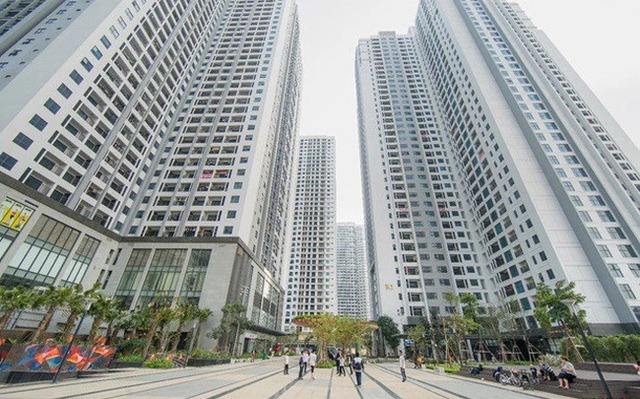Research data from the Vietnam Real Estate Brokers Association (VARS) shows that the real estate market has undergone positive changes over time but still faces many difficulties and challenges that will take a long time to overcome. In particular, the shortage of housing supply, especially in the affordable segment with reasonable prices, remains a pressing issue.
Specifically, the total housing supply from 2018 to 2022 continuously decreased from 180,000 units in 2018 (before the pandemic) to around 48,000 units in 2022. In 2023, the total housing supply slightly increased to about 55,000 units, but it only accounted for 32% compared to 2018.
The housing supply structure is increasingly imbalanced, with new projects mainly offering high-end products with prices starting from 40 million VND/m2, contradicting the scarcity of affordable housing (below 25 million VND/m2). As a result, the proportion of affordable housing decreased from 30% in 2019 to 7% in 2022 and further dropped to 6% in 2023.
The widening gap between supply and demand has pushed up real estate prices, especially in the housing segment. The high prices have exceeded the affordability of many homebuyers. Market liquidity has decreased significantly, inventory has increased, and real estate businesses have faced serious capital shortages. Many projects have been left unfinished, directly affecting the 40 related sectors such as construction materials, machinery, equipment, and furniture.
To address this situation, real estate businesses need to reduce selling prices. The government also needs to study and establish a taxation policy targeting asset accumulators and property owners who do not use or develop their land.
Price Difficulties in the City Center
However, in reality, it is challenging to lower housing prices because these products mainly focus on central districts where land supply is increasingly scarce. Therefore, developers concentrate on developing high-end segments to maximize profit. The continuous increase in financial costs, building materials prices, and labor costs forces developers to sell at higher prices.

Additionally, there are very few ongoing residential projects in the city center due to lengthy legal procedures, while the demand for housing remains high and is still increasing. Therefore, developers with projects currently available have a competitive advantage in determining prices.
Moreover, implementing a property tax may not necessarily lower house prices because the city’s appeal is too strong. Lowering prices may lead to increased demand, driving prices back up and causing other long-term economic consequences.
Housing Prices Depend on People’s Behavior and Mindset
VARS believes that in the long run, the price of real estate depends on people’s behavior and mindset. The real estate market will experience a decline in prices when the demand shifts from the inner city to the outskirts, where there is an advantage in land reserves for large-scale projects, leading to better selling prices.
This transition from the inner city to the outskirts has been evident in recent years. Many developers have seized the opportunity to launch large-scale projects such as Vinhomes and Ecopark in these areas. These projects offer a wider range of products, along with a variety of living spaces and integrated amenities for residents, attracting a significant number of customers to move and settle there. Thus, real estate prices in these areas have also been on the rise.
VARS’ research data shows that the housing supply will recover in 2024 due to the market’s rebound and efforts to resolve legal issues for state-managed projects. New projects are expanding into more remote areas based on infrastructure planning. This business strategy not only relieves infrastructure pressure on the city center but also enables projects to achieve better prices by having better land reserves for large-scale development, ultimately reducing the overall price of real estate.
Therefore, the government needs to expedite infrastructure projects and urban development plans. This includes expanding cities and developing satellite cities, as well as implementing key transportation projects, especially public transportation systems, to alleviate urban congestion. Additionally, it is necessary to address the permit issuance and development procedures for real estate projects.
For real estate developers, it is important to study the market demand to determine appropriate and quality development strategies that match the selling prices. Developers should also fulfill their responsibilities and commitments in terms of infrastructure development.












